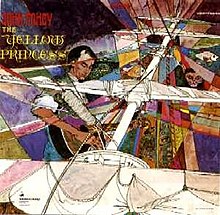The Yellow Princess (John Fahey album)
| The Yellow Princess | ||||
|---|---|---|---|---|
 |
||||
| Studio album by John Fahey | ||||
| Released | 1968 | |||
| Recorded | 1968 at Sierra Sound Laboratories, Berkeley, CA | |||
| Genre | Folk | |||
| Length | 42:36 | |||
| Label | Vanguard | |||
| Producer | John Fahey, Barrett Hansen | |||
| John Fahey chronology | ||||
|
||||
The Yellow Princess is the ninth album by American folk musician John Fahey. Released in 1968, it was his second and last release on the Vanguard label.
The Yellow Princess was Fahey's second and last release on the Vanguard label. Denny Bruce, Fahey's manager, discussed the unwillingness of the label to provide a budget for additional musicians for Of Rivers and Religion with music critic Richie Unterberger, citing the reception of The Yellow Princess. "His deal was that he could record for Takoma 'experimental records,' but to try and make commercial recordings for Vanguard, with their approval of the budget. The Yellow Princess, which had other musicians on it, didn't sell,' etc." It was after this and prior to the recording of Of Rivers and Religion that Fahey was given his release from Vanguard.
The date of recording and release is disputed by various sources. The Fahey Files states it is believed to have been recorded the spring of 1968 and released that summer. Unterberger cites a 1969 release date in the Of Rivers and Religion reissue liner notes.The John Fahey Handbook, Volume 2 cites "late 1968 or January 1969" and the recording date as June 1968 at Sierra Sound Laboratories.
Fahey's original liner notes describe the genesis of the song "The Yellow Princess", which was based on the overture to the opera La Princesse Jaune (The Yellow Princess) by composer Camille Saint-Saëns. Fahey wrote: "I once managed to copy the main theme of a passage from "The Yellow Princess Overture"... This is a stabilized improvisation upon that passage. I began it in 1954 and completed it in December 1966, in Bastrop, La."
"The Singing Bridge of Memphis, Tennessee" is a musical collage done with the collaboration of Barry Hansen. The two had worked on sound collages on Fahey's prior Vanguard release, Requia. Fahey commented that "I didn't know how to mix things on tape recorders and make edits. Barry was more knowledgeable and intelligent than me." The recording utilizes a two-minute section from a recording of "Quill Blues" by Big Boy Cleveland.
...
Wikipedia
